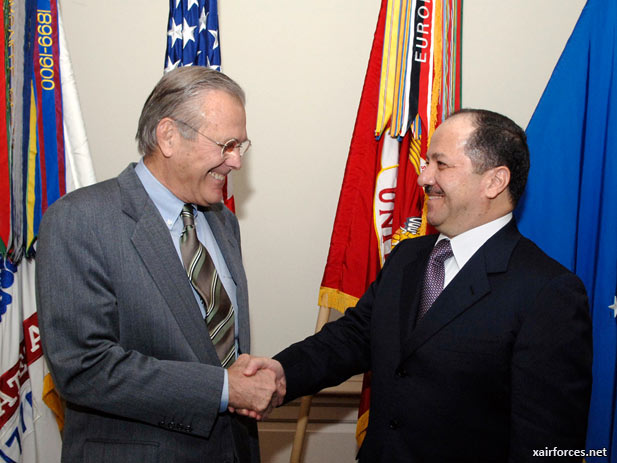
Iraq premier must not get F-16s: Kurd Leader

Masoud Barzani, the Leader of North Iraq, said he opposes the sale of F-16 warplanes to Iraq while Nuri al-Maliki is premier, as he fears they would be used against the region.
Barzani also said that he thinks that oil giant ExxonMobil, which has signed an oil exploration deal with Kurdistan against Baghdad’s wishes, could provide significant protection for the region.
His latest remarks, which follow a number of others in which the Kurdish leader has accused Maliki of centralising power and moving toward dictatorship, indicate his continued concern about the potential threat of a powerful Iraqi central government.
“The F-16 must not reach the hand of this man,” Barzani told reporters at his residence near the Kurdistan region’s capital Arbil on Sunday, referring to Maliki.
“We must either prevent him from having these weapons, or if he has them, he should not stay in his position,” Barzani said.
Barzani alleged that Maliki had discussed using F-16s against Kurdistan during a meeting with military officers.
“During a military meeting, they talked about problems between Baghdad and Arbil,” Barzani said.
“They told him, ‘Sir, just give us the authority, and we would kick them out of Arbil’,” Barzani said. “And (Maliki) answered: ‘Wait until the arrival of the F-16’.”
The US has agreed to sell 36 F-16 jets to Baghdad in a multi-billion-dollar deal aimed at increasing the capabilities of Iraq’s fledgling air force, a weak point in its national defences.
“When I went to the US, they (Exxon) wanted to see me and I met the president of the company and other people and they said they are committed to (the contract) they signed with the Kurdistan region,” Barzani said, referring to a visit to the US this month.
“If ExxonMobil came, it would be equal to 10 American military divisions,” he said, adding that “they will defend the area if their interests are there.”
On October 18, Kurdish authorities signed a deal with ExxonMobil for it to explore six areas in Kurdistan, but Baghdad regards any contracts not signed with the central government as invalid.
The Kurdistan region has been autonomous since a no-fly zone was established there in 1991, but it has a long history of conflict with the Iraqi central government, whose leaders have repeatedly sought to bring it under central control.
“That is the basic fear of the Kurds historically,” said Iraq analyst Reidar Visser, the editor of the Iraq-focused website www.historiae.org.
Jotyar Adil, a professor of political science at Salaheddin University in Arbil, said that “there are fears by the president of the region that go back to the historical memory of the Kurdish authorities of the successive Iraqi governments,” referring to past conflict between the Kurds and Baghdad.
Barzani said on March 20 that “there is an attempt to establish a 1mn-strong army whose loyalty is only to a single person,” according to an English transcript of his remarks.
Source: AFP/Arbil - Posted: April 24, 2012
Photo: Old Secretary of Defense Donald H. Rumsfeld (left) welcomes President of the Iraqi Kurdistan Regional Government Masoud Barzani (right) to the Pentagon on Oct. 27, 2005. Rumsfeld and Barzani are meeting to discuss defense issues of mutual interest. DoD photo by Helene C. Stikkel. (Photo by osd.dtic.mil)
(24.04.2012)
|